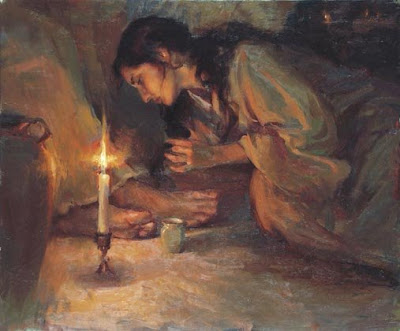Holy Saturday is sacred as the day of the Lord's rest; it has been called
the "Second Sabbath" after creation. The day is and should be the most calm
and quiet day of the entire Church year, a day broken by no liturgical function
and is chiefly a day of solemn vigil for the Lord’s resurrection.
HOLY SATURDAY
HOLY SATURDAY
"And, finally, Holy Saturday is the day of God’s silence. It must be a day of silence. We must do everything possible so that it is a day of silence, as that Day, which was the day of God’s silence. Jesus placed in the sepulcher shares with the whole of humanity the tragedy of death as a silence that speaks and expresses love as solidarity with all those ever abandoned, which the Son of God reaches filling the emptiness that only the infinite mercy of God the Father can fill. God is silent, but out of love. In this day love, that silent love, becomes expectation of life in the resurrection. We think of Holy Saturday: it will do us good to think of the silence of Our Lady, “the Believer,” who in silence awaited the Resurrection.
Our Lady must be the icon for us of that Holy Saturday. To think much of how Our Lady lived that Holy Saturday, in expectation. It is a love that does not doubt, but that hopes in the Lord’s word, and which becomes manifest and splendid on Easter day." - Pope Francis, Wednesday Audience, 03/23/16
Our Lady must be the icon for us of that Holy Saturday. To think much of how Our Lady lived that Holy Saturday, in expectation. It is a love that does not doubt, but that hopes in the Lord’s word, and which becomes manifest and splendid on Easter day." - Pope Francis, Wednesday Audience, 03/23/16
"The last day of the Holy Week: a fruitful stillness before the breathtaking action of the night.
Perhaps only the greatest Russian writers have succeeded in painting it as it is, a pause,
a last moment of waiting, made holy by the Lord's rest in the tomb.
a last moment of waiting, made holy by the Lord's rest in the tomb.
The Church is waiting at the tomb and weeps.
She sees where the Lord has been laid, where the woman had buried Adam,
where man is buried where he had come to grief through her evil counsel.
She sees it and weeps. She weeps at the Lord's tomb, as the Lord wept for Lazarus:
for sin which killed the giver of all life. But her tears are soft, and she is at peace. . . .
for sin which killed the giver of all life. But her tears are soft, and she is at peace. . . .
The death of Adam has lost its terrors in the tomb
of Christ. The death for obedience' sake has snuffed out sin. No longer does amassa
which makes the seers — men and the Church — at peace and full of hope."
of Christ. The death for obedience' sake has snuffed out sin. No longer does a
which makes the seers — men and the Church — at peace and full of hope."
D. Aemiliana Löhr, The Great Week

“Today a great silence reigns on earth,
a great silence and a great stillness. A great silence because the King is asleep.
The earth trembled and is still because God has fallen asleep in the flesh and
he has raised up all who have slept ever since the world began. . .
He has gone to search for Adam, our first father, as for a lost sheep."
From ancient homily, Liturgy of the Hours, Holy Saturday
Ancient Homily for Holy Saturday - YouTube (7:47 mins)
Ancient Homily for Holy Saturday - YouTube (7:47 mins)

"... Holy Saturday...the more I reflect on it,
the more this seems to be fitting for the nature of our human life:
we are still awaiting Easter; we are not yet standing in the full light
but walking toward it full of trust."
- Pope Benedict XVI, Milestones: Memoirs, 1927-1977




